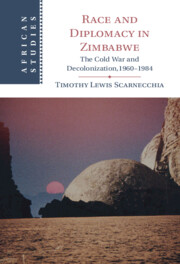Book contents
- Race and Diplomacy in Zimbabwe
- African Studies Series
- Race and Diplomacy in Zimbabwe
- Copyright page
- Contents
- Figures
- Acknowledgments
- Abbreviations
- Introduction
- 1 Historical Background
- 2 The Early 1970s
- 3 Liberation Struggles in Southern Africa
- 4 “We Don’t Give a Damn about Rhodesia”
- 5 Negotiating Independence
- 6 Negotiating Independently
- 7 The Big Gamble
- 8 The 1980 Elections and the First Years of Independence
- 9 Gukurahundi and Zimbabwe’s Place in the 1980s Cold War
- Conclusion
- Select Bibliography
- Index
- African Studies Series
3 - Liberation Struggles in Southern Africa
1975–1976
- Race and Diplomacy in Zimbabwe
- African Studies Series
- Race and Diplomacy in Zimbabwe
- Copyright page
- Contents
- Figures
- Acknowledgments
- Abbreviations
- Introduction
- 1 Historical Background
- 2 The Early 1970s
- 3 Liberation Struggles in Southern Africa
- 4 “We Don’t Give a Damn about Rhodesia”
- 5 Negotiating Independence
- 6 Negotiating Independently
- 7 The Big Gamble
- 8 The 1980 Elections and the First Years of Independence
- 9 Gukurahundi and Zimbabwe’s Place in the 1980s Cold War
- Conclusion
- Select Bibliography
- Index
- African Studies Series
Summary
This chapter mainly concerns the shuttle diplomacy of the US secretary of state, Henry A. Kissinger, in 1976. Kissinger made two trips to Africa in 1976, hoping to influence Cold War conflicts in southern Africa. Kissinger succeeded, with South African help, to force the Rhodesian prime minister, Ian Smith, to concede to the concept of majority rule in two years. Plans were then put in motion for an all-parties conference in Geneva, run by the British. This chapter examines the pre-conference diplomacy, including attempts by Mugabe and Nkomo to have those military leaders from ZANLA who were accused of the murder of Herbert Chitepo released by the Zambians. This chapter includes coverage of discussions between Kissinger and the South Africans, the British, and with Tanzanian president Julius Nyerere. There is also discussion of a letter by Bishop Muzorewa charging Nyerere and Mozambique’s Samora Machel of keeping him and Reverend Sithole from reaching the liberation forces in Mozambique and Tanzania.
Keywords
- Type
- Chapter
- Information
- Race and Diplomacy in ZimbabweThe Cold War and Decolonization,1960–1984, pp. 64 - 95Publisher: Cambridge University PressPrint publication year: 2021

